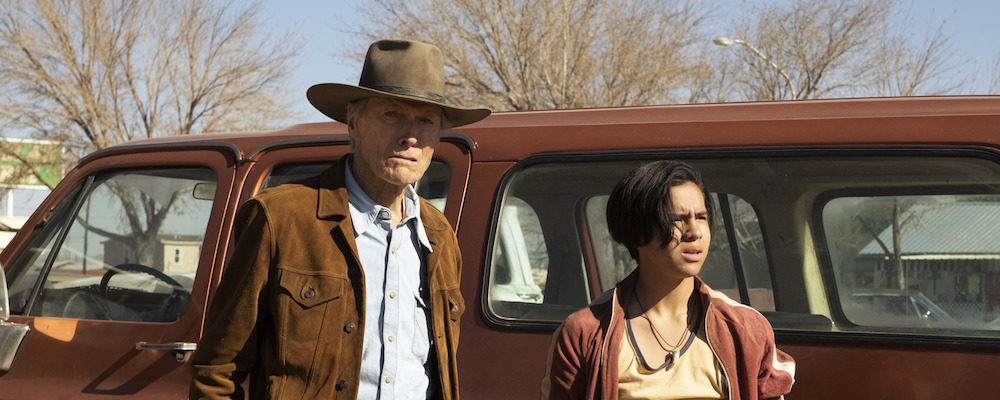‘Cry Macho’: At 91, Clint Eastwood Proves He Can Still Deliver a Western With Heart
Alci Rengifo
There is something irresistibly inspiring about watching Clint Eastwood, at the age of 91, emerging from a truck into frame, the sunlight behind him, in his classic tough guy stance. Long after others have retired, Eastwood is still making movies, knocking them out on nearly an annual basis. His latest, “Cry Macho,” is made with the speediness Eastwood is famous (and infamous) for, yet it also has the feel of a film being made with great joy. That’s not what the ads are selling with their artwork suggesting this is a brooding western. As the title suggests, there are macho guys in this film, guns are pulled once or twice, but it’s more of a warmhearted journey about bonds.
Eastwood plays Mike Milo, a character similar to many he has mastered before. Mike lives in 1979 rural Texas, where long ago he was a respected horse breeder and rodeo star. A tragedy sent him diving into alcoholism, which results in him getting fired by Howard Polk (Dwight Yoakam), a local big shot and ranch owner. But Howard likes the old cowboy and a year later entrusts him with a sensitive mission. He wants Mike to cross the border into Mexico and find his son, who is reportedly trapped in an abusive home with his “crazy” mother, and bring him back. Mike feels he still owes Howard for giving him a roof despite his faults. He drives into Mexico and first meets Howard’s ex, Lara (Fernanda Urrejola), who is a little nuts, likely a drug runner. Despite her warnings, Mike does find the kid, Rafa (Eduardo Minett), who partakes in local cockfighting with his beloved rooster, “Macho.” With promises of meeting his important father and living on his land, Rafa agrees to leave with the “gringo.”
“Cry Macho” is based on a 1976 novel by N. Richard Nash, who co-wrote the screenplay with Nick Schenk, scribe of one of Eastwood’s best recent films, “The Mule,” and before that, “Gran Torino.” After a few large-scale projects tackling everything from the Iraq War to the 1996 Olympics bombing, this feels like Eastwood wanting to come home to a smaller version of the genre that made his name. The backdrop of “Cry Macho” is composed of vast deserts hiding small towns. Eastwood is so eager to get to these towns that the exposition of the story hurtles by. He’s a famous one-take director, so the opening feels a bit rushed and even clunky when Howard suddenly appears at Mike’s house to spew his request. We never even learn why Lara lives in a lavish Mexican estate with apparently just two goon bodyguards. Unless Eastwood trusts that we will automatically assume she must be a cartel boss of some kind. She feels more like a necessary plot device to put in place a threat that will chase Mike and Rafa down their road trip to Texas.
It’s the middle of the movie that really works in that classic Eastwood taste for buddy journeys with some old-fashioned manliness. Although another refreshing element is that Eastwood here also dumps the overly conservative ethos of films like “American Sniper” and “The 15:17 to Paris,” which felt like light versions of Sean Hannity-style idealism. There’s a fatherly tenderness to how Mike and Rafa hit the road, with Rafa tempting the old man to drink tequila with him, or warn him to find clothing more fitting for their surroundings. The dialogue has fun, wise wit. Rafa boasts that a Mexican can always ride better than a gringo, Mike just smiles and retorts that the kid is half-gringo. With one of Lara’s bodyguards in pursuit, the pair arrives in a town that turns into a rugged oasis. Mike helps a local break wild horses and they find refuge in the restaurant of a widow, Marta (Natalia Traven), who is instantly smitten with Mike. Eastwood expertly shows the bond growing between Mike and Rafa. They depend on each other, but also provide a sense of family missing in their lives. Eastwood also likes to slow down the pace and immerse us in the serenity of a small place, or how nice it must feel to wake up to find a fresh plate of tortillas and beans on your doorstep.
By now Eastwood is still directing because he feels like it or genuinely enjoys finding an excuse to tell some kind of story onscreen. Moments of “Cry Macho” feel like the old pro having fun with us, like an early scene where the much, much younger Lara tries to lure him into her bed. Eastwood certainly knows we won’t believe a moment of it, or when he breaks a horse and punches a thug as if they’re about to brawl. It could also be sly commentary on the themes of the movie. “Macho” is Spanish slang for toughness, and Mike’s journey with Rafa is about two tough males who discover strength can mean more emotional, insightful things than brute force. They hunker down in an empty chapel one night and Mike’s voice becomes thin and cracks when Rafa asks if he has any children. Because the story is set in 1980, there’s greater intimacy in a world without iPhones or home computers. No one watches television in this movie. It still has a few moments fit for a good modern western, such as showdowns in desert highways and near-captures involving crooked cops. “Cry Macho” is a tight piece of filmmaking, with a few rough edges we can forgive Eastwood because his sense of pace and storytelling remain intact. At 91, he’s still doing it his way.
“Cry Macho” releases Sept. 17 on HBO Max and in theaters nationwide.

